You are here
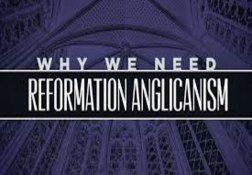 November 11 2019
THOUGHTS ON THE NEW ANGLICAN REFORMATION -- Part 3
November 11 2019
THOUGHTS ON THE NEW ANGLICAN REFORMATION -- Part 3
Some years ago, I was teaching young ordinands in one of the Diocese of South East Asia when the bishop asked to see me in private. After courteous preliminaries he asked me: "What is your definition of a New Anglican?" He was referencing the name of the missionary society that I had then been leading for two decades, the New Anglican Missionary Society (NAMS), but he was assuming the phrase "New Anglican" meant a different kind of Anglican.
Read more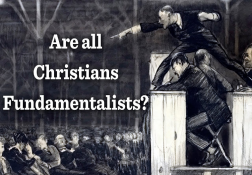 November 09 2019
Finding Truth Amid Tension
November 09 2019
Finding Truth Amid Tension
More a mindset than a set of doctrines
But are there common features of a fundamentalist mindset to be found in these varied expressions? Consider these eight tell-tale signs:
First, fundamentalists of all stripes tend to reflect black and white thinking. They have little place for ambiguity. Certainty must be established.
Read more October 23 2019
DIVORCE IN THE ANGLICAN FAMILY: A Look Back at the Break-Up
October 23 2019
DIVORCE IN THE ANGLICAN FAMILY: A Look Back at the Break-Up
Archbishop Williams's switch from "communion" to "family" reminded me of something I had written fifteen years ago, titled "The Divorce," because while "quarreling until the cows come home" is a nice sentiment, it is not the way many families end up. Fifteen years on, real repentance and reconciliation seem as far away as ever.
So at the risk of reviving unhappy quarrels around the supper table, here it is:
***
Read more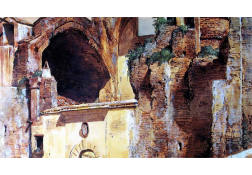 October 17 2019
WHEN DID ANGLICANISM BEGIN? TRACT II (PART 1)
October 17 2019
WHEN DID ANGLICANISM BEGIN? TRACT II (PART 1)
If you say "with Henry VIII" in any of the classes I teach at Cranmer Theological House, I will threaten you with either an automatic F or a pile of remedial work. Many incorrectly assume that the Church in England began with Henry VIII's desire for Anne Boleyn and the male heir she might possibly give him. But clearly there was an English Church before Henry VIII declared himself the head of the English Church in 1534.
Read more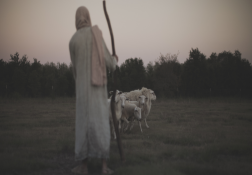 October 11 2019
PASTORAL POLEMICS
October 11 2019
PASTORAL POLEMICS
Many theologians and teachers inevitably enclose themselves within towers of intellectual superiority and communities of arcane conversation. The spirit of pride and rivalry among them may possibly engender the tendency to novelty of thought and sensational opinion. There are some minds that simply must strive for attention and originality. The humble service of the gospel is too drab for their professional ambition.
Read more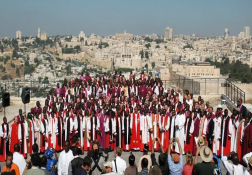 October 11 2019
CLAUSE 13 IMPLICATIONS: Reply to a Clergyman in the Church of England
October 11 2019
CLAUSE 13 IMPLICATIONS: Reply to a Clergyman in the Church of England
As a recently-ordained theologically-conservative minister in the Church of England who has not yet signed the Jerusalem Declaration, I struggle to understand what a commitment to Clause 13 would mean in practice.
I serve under the authority of my (orthodox) diocesan bishop. So Clause 13 does not require me to reject his authority.
Read more September 21 2019
Archaeologists Find Church of the Apostles Near Sea of Galilee
September 21 2019
Archaeologists Find Church of the Apostles Near Sea of Galilee
The team later found the church's mosaic floors, which had been buried for almost 1,500 years. According to the Center's press release, these discoveries indicate a "large and magnificent church."
Ancient documents mention the Church of the Apostles, including one written by a Bavarian bishop named Willibald in 725 A.D. "[Willibald] states that the church was in Bethsaida built over the house of Peter and Andrew, among the first disciples of Jesus," Notley said.
Read more September 16 2019
THOUGHTS ON THE JERUSALEM DECLARATION 3: Should Clause 13 Be Excised?
September 16 2019
THOUGHTS ON THE JERUSALEM DECLARATION 3: Should Clause 13 Be Excised?
I was talking recently with a friend from the Church of England about why more Evangelicals there had not openly supported the Gafcon movement. He began by saying how positive he and his colleagues were about the Assemblies in 2008, 2013 and 2018 and also about the Jerusalem Declaration as a fine confession of biblical faith.
Read more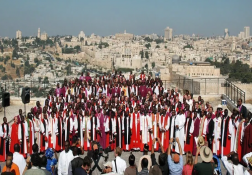 September 13 2019
THOUGHTS ON THE JERUSALEM DECLARATION 2: Proposing a Life-and-Death Amendment
September 13 2019
THOUGHTS ON THE JERUSALEM DECLARATION 2: Proposing a Life-and-Death Amendment
The next clauses 8-13 address those issues of particular urgency in our day: marriage and sexuality; the mission imperative; stewardship of the earth and commitment to justice; and church unity and diversity and its limits (ecumenism and discipline). When our Statement group was considering these issues, we neglected to address one topic: life and death, which is equally rooted in Scripture and under attack in contemporary culture.
Read more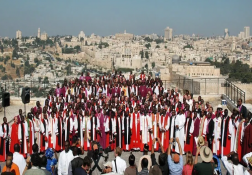 September 10 2019
THOUGHTS ON THE JERUSALEM DECLARATION 1: Gafcon and the Church
September 10 2019
THOUGHTS ON THE JERUSALEM DECLARATION 1: Gafcon and the Church
In this piece Rowan Williams speaks positively of the "tenets of orthodoxy" expressed by "those who met for prayer and pilgrimage," noting that these tenets were "shared by the vast majority of Anglicans worldwide, even if there may be differences of emphasis and perspective on some issues." (Issues like whether God ordained marriage exclusively between a man and a woman?
Read more


